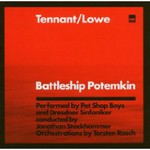Battleship Potemkin
Studio Album by Pet Shop Boys released in 2005Battleship Potemkin review
A few years after their foray into musicals, the Pet Shop Boys, who are quite possibly disco-pop's most intellectual act, have returned with another project: a live score to such an iconic piece of film history as Sergei Eisenstein's Battleship Potemkin. It was only a matter of time before Neil Tennant and Chris Lowe stepped into the world of classical music. Aesthetically and musically Pet Shop Boys have long flirted with totalitarian imagery (take, for example, the lyrics to West End Girls) and sounds, while their arch, theatrical bent perfectly suits the task of soundtracking propaganda. The music was recorded in London and Berlin with the Dresdner Sinfoniker in 2004, with orchestrations by Torsten Rasch. It was premiered on September 12 last year, when Pet Shop Boys and the Dresdner Sinfoniker played the score to accompany a screening of the film in London’s Trafalgar Square. The free event attracted 25,000 people.
Eisenstein’s film, made in 1925, describes the mutiny of the sailors on the Battleship Potemkin in 1905, an event which then linked up with the local population in Odessa as part of Russia's 1905 revolution. In France the authorities destroyed the film; in Germany it was subject to censorship and in Britain it was banned, apart from club performances, until 1954. Even when listened to in its own right, the Pet Shop Boys' music is among their finest work in years. The string arrangements are suitably grandiose; the electronics subtle and added at just the right moments, and Neil Tennant's occasional vocal touches are judicious. The nine minute long epic Drama In The Harbour is one of the highlights, with its echoes of Ennio Morricone's score for John Carpenter's The Thing. But of course, when viewed with the film itself, The Pet Shop Boys score comes to life. Given the era the film is executed with a degree of subtlety, and Eisenstein's cinematography is superbly evocative, and rendered all the more powerful through Tennant and Lowe's superlative score.
For the film’s Moscow premiere in January 1926, its soundtrack was a medley of existing pieces by Beethoven, Tchaikovsky and others, but when the film reached Berlin later that year, it had its first specially-written score, by the radical composer Edmund Meisel. Eisenstein would subsequently acclaim the power of such “unity of fused musical and visual images” in his work and is said to have hoped that a new Battleship Potemkin soundtrack would be written for each new decade. In April 2003, Philip Dodd, director of the Institute of Contemporary Arts in London, approached Neil Tennant and Chris Lowe and suggested that they might write a new score for the film and perform it as a free concert in Trafalgar Square. They wrote the music in the order it would be heard, following the structure of the film. From the beginning they resolved to combine electronic music and strings; the lyrics of the three vocal pieces within it were largely inspired by the film’s original subtitles, though one – After All (The Odessa Staircase) – was also prompted by the role in London of Trafalgar Square as a home of political dissent. The soundtrack includes three new songs in a largely instrumental score, and it is all a decidedly internationalist enterprise.

